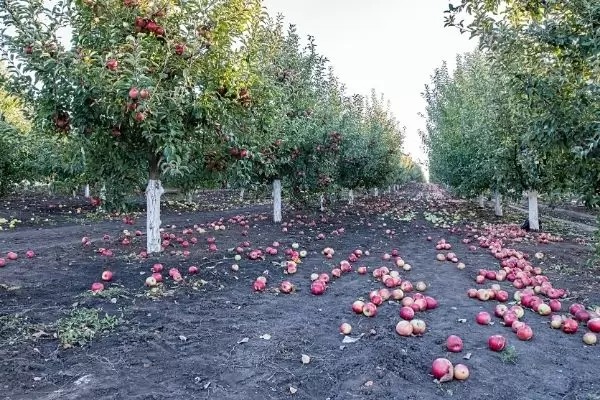
The famous apple orchards of Kalam, in the Khyber Pakhtunkhwa region, have been severely affected by climate change this year. Unpredictable rain patterns have led to a significant 60% drop in apple production, leaving local farmers struggling. While farmers blame the heavy rains and hailstorms for their losses, agricultural experts suggest that adopting new, climate-resistant apple varieties could help mitigate future risks.
Kalam, located in the Bahrain district of Swat, is renowned globally for its apples, praised for their flavor, color, and beauty. The orchards stretch across hundreds of acres, but the unpredictable weather has caused severe damage this year.
Malik Hussain Naseeb, a local farmer, shared his concerns while tending to his apple trees:
“I planted this orchard in 2014, but due to lack of experience, we didn’t take proper care of it. When diseases affect the trees, we don’t know how to treat them. This year, heavy rains and hailstorms caused the blossoms to fall, resulting in no fruit production.”
Also Read: Bomb Blast Near Foreign Envoys' Convoy in Swat: One Policeman Martyred, Three Injured
Agricultural experts note that apple orchards thrive in cooler regions where temperatures range between 21 to 24 degrees Celsius. However, with the onset of climate change, farmers are urged to educate themselves about newer, more resilient seed varieties.
Another farmer, Ameer Zada from Kalam’s Kas area, echoed these sentiments, stating that despite years of experience, his orchards have not yielded the desired results:
“I’ve been farming for 13 years, but I still haven’t seen good outcomes. We rely on advice from pesticide sellers, but it’s often ineffective. Heavy rains this year damaged the blossoms, and without blossoms, no fruit can grow.”
According to the Ministry of National Food Security and Research, Pakistan’s total apple production for 2022-23 was approximately 800,000 tons, with Khyber Pakhtunkhwa contributing 46,000 tons. Climate change has impacted not only human and animal life but also crop yields, including vegetables and fruits.
Field assistant Sadiq Amin from the Agriculture Department in Bahrain shared insights into the challenges farmers faced this year: “This April, heavy snowfall hit the region just as the apple trees blossomed, causing the flowers to fall. In our care, we used preventive sprays in orchards, which helped retain 40% of the yield. However, those who didn’t use the spray suffered greater losses. Last year, we had 100% yield, but this year it dropped to around 40%.”
Amin emphasized the need to plant new, registered seed varieties, such as Gala, to combat the effects of climate change. “There are three types of Gala apples: Gala Mast, Royal Gala, and Treco Gala, all registered with the government,” he added.
The apple harvesting season in Kalam runs from September to late November. Still, researchers believe that if farmers switch to government-registered seeds, they could see a significant boost in production.